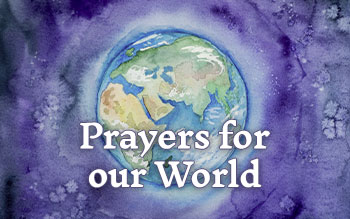Displaying items by tag: poverty
Millions at risk of UC ‘lockout’
New research by the Salvation Army shows that millions of people risk being unable to access their sickness benefits due to faults in the Universal Credit system. Researchers found that 85% of people surveyed struggled to complete their claim. Of these, nearly 60% cited not being able to use a computer or not understanding the complicated system as the main problems they faced. Thousands of vulnerable people on low incomes - particularly those with mental illness - are at risk of destitution because they do not have the skills or support to apply for and maintain a UC benefit claim. There is ‘overwhelming evidence’ that many people find it a struggle to engage with the mainly digital benefit, leaving them unable to pay rent or buy food and effectively locking them out of employment support.
Good News - 2019 was the Best Year Ever
Let’s be encouraged and thankful as we reflect on some positive statistics and information that Nicholas Kristoff has compiled in the New York Times.
For humanity over all, life just keeps getting better.
If you’re depressed by the state of the world, let me toss out an idea: In the long arc of human history, 2019 has been the best year ever.
The bad things that you fret about are true. But it’s also true that 2019 was probably the year in which children were least likely to die, adults were least likely to be illiterate and people were least likely to suffer excruciating and disfiguring diseases.
Every single day in recent years, another 325,000 people got their first access to electricity. Each day, more than 200,000 got piped water for the first time. And some 650,000 went online for the first time, every single day.
Perhaps the greatest calamity for anyone is to lose a child. That used to be common: Historically, almost half of all humans died in childhood. As recently as 1950, 27 percent of all children still died by age 15. Now that figure has dropped to about 4 percent.
“If you were given the opportunity to choose the time you were born in, it’d be pretty risky to choose a time in any of the thousands of generations in the past,” noted Max Roser, an Oxford University economist who runs the Our World in Data website. “Almost everyone lived in poverty, hunger was widespread and famines common.”
But … but … but President Trump! But climate change! War in Yemen! Starvation in Venezuela! Risk of nuclear war with North Korea. …
All those are important concerns, and that’s why I write about them regularly. Yet I fear that the news media and the humanitarian world focus so relentlessly on the bad news that we leave the public believing that every trend is going in the wrong direction. A majority of Americans say in polls that the share of the world population living in poverty is increasing — yet one of the trends of the last 50 years has been a huge reduction in global poverty.
As recently as 1981, 42 percent of the planet’s population endured “extreme poverty,” defined by the United Nations as living on less than about $2 a day. That portion has plunged to less than 10 percent of the world’s population now.
Every day for a decade, newspapers could have carried the headline “Another 170,000 Moved Out of Extreme Poverty Yesterday.” Or if one uses a higher threshold, the headline could have been: “The Number of People Living on More Than $10 a Day Increased by 245,000 Yesterday.”
Many of those moving up are still very poor, of course. But because they are less poor, they are less likely to remain illiterate or to starve: People often think that famine is routine, but the last famine recognized by the World Food Program struck just part of one state in South Sudan and lasted for only a few months in 2017.
Diseases like polio, leprosy, river blindness and elephantiasis are on the decline, and global efforts have turned the tide on AIDS. A half century ago, a majority of the world’s people had always been illiterate; now we are approaching 90 percent adult literacy. There have been particularly large gains in girls’ education — and few forces change the world so much as education and the empowerment of women.
You may feel uncomfortable reading this. It can seem tasteless, misleading or counterproductive to hail progress when there is still so much wrong with the world. I get that. In addition, the numbers are subject to debate and the 2019 figures are based on extrapolation. But I worry that deep pessimism about the state of the world is paralyzing rather than empowering; excessive pessimism can leave people feeling not just hopeless but also helpless.
Readers constantly tell me, for example, that if we save children’s lives, the result will be a population crisis that will cause new famines. They don’t realize that when parents are confident that their children will survive, and have access to birth control, they have fewer children. Bangladesh was once derided by Henry Kissinger as a “basket case,” yet now its economy grows much faster than America’s and Bangladeshi women average just 2.1 births (down from 6.9 in 1973).
Yes, it’s still appalling that a child dies somewhere in the world every six seconds — but consider that just a couple of decades ago, a child died every three seconds. Recognizing that progress is possible can be a spur to do more, and that’s why I write this annual reminder of gains against the common enemies of humanity.
So I promise to tear my hair out every other day, but let’s interrupt our gloom for a nanosecond to note what historians may eventually see as the most important trend in the world in the early 21st century: our progress toward elimination of hideous diseases, illiteracy and the most extreme poverty.
When I was born in 1959, a majority of the world’s population had always been illiterate and lived in extreme poverty. By the time I die, illiteracy and extreme poverty may be almost eliminated — and it’s difficult to imagine a greater triumph for humanity on our watch.
By Nicholas Kristof, Opinion Columnist, NY Times
More at: https://www.nytimes.com/2019/12/28/opinion/sunday/2019-best-year-poverty.html
Pray: giving thanks for the positive steps that are being made across the quoted areas including life expectancy, poverty, literacy, education, health and access to utilities.
Pray: that these advancements will not falter and that governments will continue to invest in improvements in the quality of life of their people.
Harvest Festival and foodbanks
The arrival of the harvest has long been marked in Jewish and Christian worship. Harvest Festival is just one of the ways that the Christian tradition enriches the lives of children of all backgrounds as part of daily collective worship. It is a wonderful opportunity to help children and young people to think about how food reaches their plates, and to say thank you for all they have received, as well as giving to those in need. The majority of produce donated in churches will stock foodbanks; a recent survey shows that 60% of churches are involved in either running or supporting them - through volunteers, donations, and providing venues. The Trussell Trust’s latest figures show 1.6 million people receiving three-day emergency food from its foodbanks, a 19% increase on the previous year.
Building relationships
Most British schools reopen on 2 September. During the holidays, three million children were at risk of hunger. One in five children faced food insecurity, one of the highest rates in Europe, because they were no longer receiving a daily school meal. Because of this, a variety of organisations and churches dotted across the nation have been providing free activities and hot and healthy meals to children and families who would otherwise have gone hungry. They have also been supporting and building relationships with the most vulnerable in our communities. Pray for these relationships to continue to grow after the ‘hunger clubs’ close down. Pray for the church volunteers who now have contact with some of the hidden ones in their communities to continue to give families the loving support that a compassionate church can give. Also, 37% of teachers spot malnutrition when children return to school after the holidays. Please pray for sensitive relationships to be built between families in poverty, teachers, social workers, councils, and other agencies able to support the vulnerable. See
Homeless children in shipping containers
More than 210,000 children are estimated to be homeless. The Children's Commissioner for England says that, as well as the 124,000 children officially classed as homeless, a further 90,000 are estimated to be ‘sofa-surfing’. Her report tells of families housed in repurposed shipping containers and office blocks, and whole families living in tiny spaces. Councils blamed a £159m funding gap. The report, entitled Bleak Houses, found office-block conversions in Harlow in which over 1,000 whole families live in single rooms barely bigger than a parking space, and shipping containers which are blisteringly hot in summer and freezing in the winter months being used in Bristol, Cardiff and London. The report warns that a further 375,000 children in England are in households that have fallen behind on rent or mortgage payments. This means that thousands more are at financial risk of becoming homeless in the future.
Russia: protests challenge Putin’s dominance
President Putin’s heavy-handed politics ahead of September elections have caused street protests for weeks. Russians are airing an array of grievances over economic stagnation and the Kremlin’s geopolitical isolation. Putin has turned Russia into a powerhouse to be reckoned with for foreign policy makers, but living standards have fallen five years in a row. The 50,000 protesters who converged a mile from the Kremlin recently proved that a movement that started with protests over candidates being refused to register for municipal elections has turned into a platform for a wide swathe of political concerns - local and national. Average Russians are experiencing poverty, consumer borrowing has increased almost 50%, and food chains have introduced consumer loans for shoppers, allowing families to put food on the table. Putin’s popularity is low, and social media have shown images of police beating generally peaceful protesters and detaining 2,000+ demonstrators. See
Zimbabwe: governance crisis and church aid
Far from seeing reform after Robert Mugabe was toppled, the country has fallen into deeper crisis as millions are ‘reduced to paupers’. Power cuts from dawn to long after dusk are causing families to cook on firewood in almost total darkness. Monthly earnings barely cover two weeks’ living expenses. With Mnangagwa things have gone from bad to worse with outlandish austerity measures causing 175% inflation. Multiple currencies replaced by another new Zimbabwe dollar, fuel subsidies cut, poor harvests, a cyclone and drought have compounded problems. The Zimbabwe Church is calling for the international community and the government to hear the cries of Zimbabwean families surviving on two meals a day and lacking life-saving medicine. UK aid agency CAFOD is asking for national dialogue, for all in authority to come together and address the current crisis as they do what they can to assist with food, clean water supplies, and seeds (70% of the population grow their own food).
Sudan: a price for revolution
Falafel is a cheap fast food usually snapped up quickly on the streets of Sudanese cities. But now Sadiya Seror sits with unsold trays of her chickpea patties. ‘These days people eat one meal a day; they forget the idea of three meals,’ Seror said, waiting for customers at her market stall. If you want to buy a meal for your family, it will cost around 175 Sudanese pounds. Before, the same amount would feed a family of five for three to five days.’ ‘Before’ is a reference to life prior to the pro-democracy protests that ended the 30-year corrupt regime of President Omar al-Bashir. A power-sharing deal is currently being negotiated between the military council and the civilian protesters, but what is proving harder to resolve, and dimming hopes for real change, is the impact of poverty and rising prices on a large and growing percentage of the population.
USA: three million may lose food stamps
Donald Trump’s administration has proposed a rule to tighten food stamp restrictions that would cut about 3.1 million people from the programme. Currently 43 US states allow residents automatically to become eligible for food stamps through the Supplemental Nutrition Assistance Program (SNAP) if they receive benefits from another programme, Temporary Assistance for Needy Families - TANF. The proposal, which would save the government $2.5bn a year, requires people receiving TANF to pass an income and assets review to determine eligibility for SNAP. Trump said many Americans now using SNAP do not need it, given the strong economy and low unemployment, and should be removed to save taxpayers $15bn. At present SNAP provides free food to 40 million, 12% of the total population. Last year a Trump-backed effort to pass restrictions through a farm bill was blocked by Congress, following a month-long, partisan debate.
Mozambique: pray for renewal
Before Cyclone Idai devastated 1.7 million lives, Mozambique was known as the ‘Land of Smiles’. Now there is no electricity, no running water, homelessness, cholera and many still awaiting aid. But the greatest tragedy is that many of these souls were unprepared to face eternity that day. In fact, many in Mozambique have yet to even be reached with the Gospel of Jesus. In recent years spiritual responsiveness has increased, and many are turning to Jesus. But the urgency remains. Rampant disease, natural disasters, and widespread poverty were there before Idai. The time for people to hear about Jesus is now. Pray for true freedom for those in bondage to poverty, disease, witchcraft, and animism. Pray for the Church in Mozambique and neighbouring nations, for its leaders to grow in spiritual maturity and Biblical understanding. It is believed that 40% of the world’s unmined rubies are in this poverty-stricken country. Pray for honest investment into underdeveloped resources to strengthen the fragile economy.









